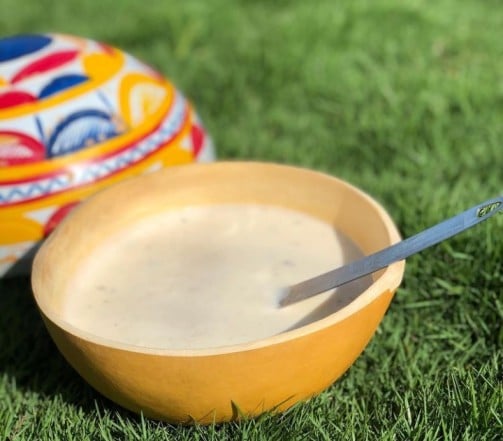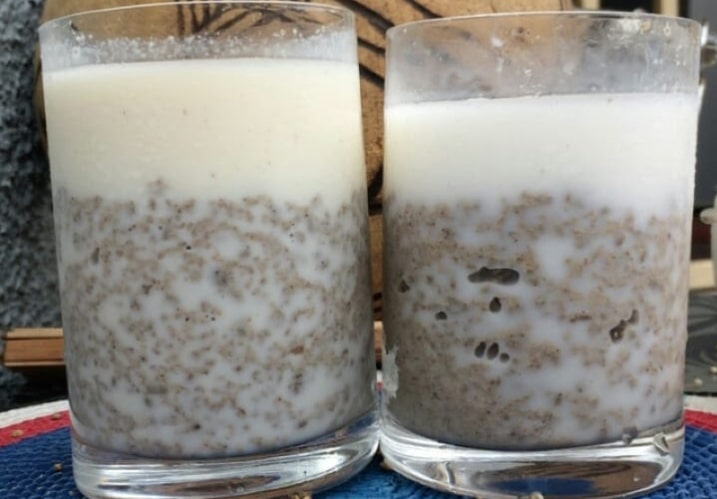Fura da nono is one of the many popular local drinks we have in Nigeria. The drink comes from the northern part of the country, although today it is enjoyed in every corner of the country and even beyond.
Fura da nono is a local type of gruel made from millet balls (fura) and cow milk (nono). The milk is usually one that has been fermented and is usually very thick.
Fura da nono has a sweet taste and some people prefer it to the regular yoghurt they sell which would have gone through some form of processing.
What makes fura da nono great, however, is not just the taste but how healthy the drink is. It involves no processing, meaning the nutrients in the millet and milk and richly present.
Millet is a very healthy grain, containing a lot of minerals including calcium, manganese, fibre, phosphorus, and much more, and it is equally loaded with vitamins.
Nono is gotten directly from grass-fed cows, thus the milk is rich in a lot of nutrients as well.
Fresh cow milk is very rich in vitamin B2 (riboflavin), vitamin B12, vitamin D, calcium, phosphorus, protein and selenium. Also, fresh milk is packed with conjugated linoleic acid and omega-3 fatty acids. [1]
So today, we would be looking at some of the health benefits of fura da nono.
7 Fresh Health Benefits of Fura da Nono

Below are some of the nutritional benefits that are associated with drinking fura da nono:
1. Reduces cholesterol levels
Fura is rich in Vitamins B3 which helps to reduce bad cholesterol (LDL) levels in the body. Bad cholesterol has been linked as the cause of a lot of heart-related issues.
Unfortunately, many of the things we consume only help in raising it. However, the vitamin B3 present in Fura will help to lower the bad cholesterol levels while increasing good cholesterol (HDL) which is vital for the body. [3]
2. Keeps the bones strong
Both the millet and the milk in fura da nono are rich in calcium, which is very vital for maintaining strong bones and teeth.
It also contains phosphorus and vitamin D, which are needed for maintaining bone density and preventing diseases like osteoporosis. [2]
3. Lowers the risk of heart attacks
Another health benefit of taking fura da nono is that it lowers the risk of heart attacks.
This is because it contains magnesium, which has been observed to lower blood pressure, reducing the chances of a heart attack.
The Vitamin B3 present also reduces bad cholesterol levels, further lowering the risks of a heart attack. That is why millet is regarded as a heart-healthy food.
4. Aids digestion and prevents constipation
Fura da nono is very rich in fibre, which aids digestion. It does this by easing bowel movement and allowing the food to digest properly.
This also prevents constipation and irregular bowel movement (IBS).
5. Helps with fat metabolism
The phosphorus in fura da nono helps with fat metabolism. The fat (lipids) are broken down into smaller compounds which would be used to provide energy to cells in the body.
Fat is very complex to break down but the presence of phosphorus aids the process. [4]

6. Might reduce the risk of type 2 diabetes
Taking fura da nono also reduces the chances of developing type 2 diabetes.
This is because the millet is rich in magnesium, which is very essential in preventing and managing diabetes.
Type 2 diabetes has also been observed to be caused by a lack of magnesium. So taking fura da nono would help in that regard.
7. Boosts brain health
Milk is a vital food for the brain. This is one of the best health benefits of fura da nono.
Fura da nono has an abundance of vitamin B, which helps in nourishing your nerves and maintaining a proper sleep cycle.
Vitamin B12 is known to boost your memory power, cognitive abilities and sharpness. Drinking milk like fura da nono is particularly important in enhancing the overall brain development of a growing child.
Side Effects of Fura da Nono
To ensure that you derive the health benefits of Fura da Nono, you need to be way of the potential side effects as well.
One major concern about Fura da Nono is its hygiene during preparation.
A recent study evaluated the microbiological quality of locally fermented milk (nono) and the fermented milk-cereal mixture (fura da nono) in Bauchi, Nigeria.
It found significant contamination with coliforms and various bacterial and fungal isolates, including Staphylococcus aureus, Escherichia coli, and Aspergillus species.
The microbial load was notably high, highlighting the need for improved hygiene during production and handling to ensure the safety of these traditional beverages.
Furthermore, the consumption of fura da nono may lead to gastrointestinal issues such as diarrhea, stomach cramps, and vomiting due to contamination with bacteria like Escherichia coli and Staphylococcus aureus.
There is also a risk of infections from pathogenic fungi such as Aspergillus species, particularly in individuals with weakened immune systems.
Finally, the presence of probiotic lactic acid bacteria carrying antibiotic resistance genes could potentially transfer these genes to pathogens, complicating the treatment of bacterial infections.
ALSO READ:
- 7 Potent Health Benefits of Nigerian Pear (Ube)
- Health Benefits of African Velvet Bean (Ukpaka)
- Health Benefits of Tapioca (Kpo Kpo garri)
- 6 Awesome Health Benefits of African Velvet Tamarind (Icheku)
Collins Nwokolo is a human physiologist, writer and health enthusiast. He loves writing helpful articles on health and fitness, which he enjoys sharing with everyone.





